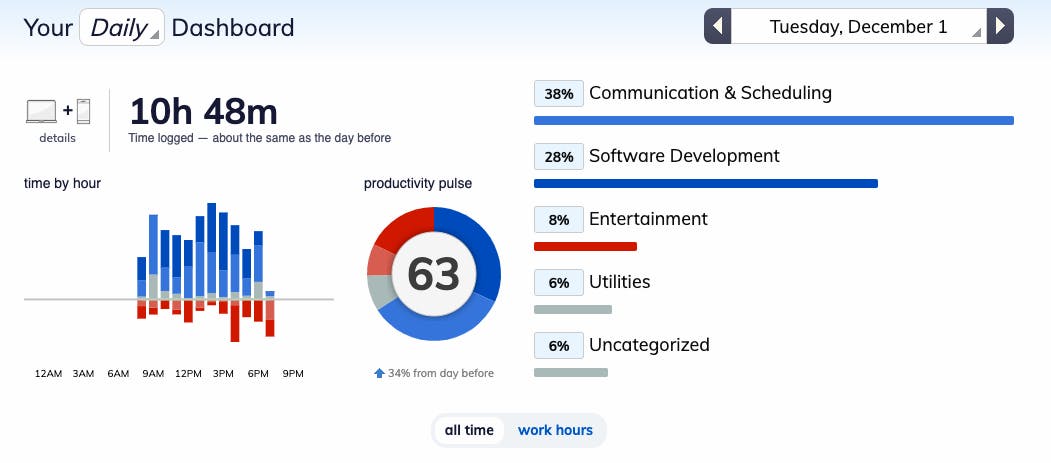This year has been an interesting one, not least of all because many people around the world - especially in the tech sector - ended up working from home for an extended period of time.
Working from home used to have something of a workplace stigma around it. Employers were seemingly sceptical of how you could be productive in such a distracting environment. Needless to say, it's been proven it can be done, but what I wasn't expecting is how it would be the catalyst for an actual increase in productivity. Let's take a look at some of the factors which contributed to this.
Track your productivity
The first step on any great transformative journey is to gather data. Gather data of where you started from, what you do each step of the way, and ultimately where you end up. With something as subjective as productivity, this is hard to do. For me, I've had good results using RescueTime, a tool which shows me a summary of where I spent my time on any given day.

As they say, hindsight is 20/20. Having this kind of information available makes it easy to reflect and see where you wasted time, and where you can win some extra productivity.
(Whenever I see my stats, seeing how long I spend on Slack per day is a bit jarring at first, but then I remember that on average, office workers spend about 28% of their day on email.)
Tracking where your time is spent isn't a step you should skip. It's like training your body. If you are trying to lose 10kg but never set foot on the scales, how will you know if it is working?
If you are trying to boost your productivity, but have no way of measuring it, then good luck to you.
Avoid multitasking
Humans are good at a lot of things, but generally not multi-tasking, or remembering lots of small things. This leads to a well-known problem called "context switching", where your productivity will effectively plummet when you try to switch between multiple tasks.
This happens for a few reasons, but essentially, the "context" that you create around a task consists of lots of small pieces of information which you need to keep in your head to complete the task. If at any point, someone or something interrupts your tasks, all of these small bits of context are at risk of being lost. Even if the distraction is only a minute long, the cost of switching between tasks will make the impact much greater than just 1 minute.
According to Todd Waits
[...] Switching between projects requires an operational overhead for the team member to figure out where he or she left off, what needs to be done, how that work fits in the project, etc. Once a team member is assigned five projects, his or her ability to contribute to any given project drops below 10 percent, with 80 percent effort being lost to switching between project contexts.
The effects of context switching are well known and impossible to conquer. No matter how good you think you are when it comes to multi-tasking, chances are, you are giving yourself far too much credit. The only way to properly combat the effects of context switching is to remove it from the equation as much as possible.
Carl Newport's excellent book "Deep work" takes a deep dive into this topic and expands on systems which you can use to get the most out of the tasks that matter. If you're going to take anything away from this article, let it be this.
Don't multitask. It doesn't work.
Externalise everything
This was the big one for me.
It's easy to say "Don't multitask" I know. In practice, it is a lot harder, because even if you don't plan to do it, all it takes is an errant Slack message and then Boom, context switched. (It's worth noting, RescueTime has an awesome Slack integration to mute notifications during focus time. Killer feature)
How, then, should we solve this? After listening to Chris Bailey's "The Productivity Project", where he touches on the benefits of externalising your todo list, I became a little bit obsessed with lists. At first, it was exactly how Chris suggested it. If you have something you need to do, write it down, so you don't have to think about it anymore, essentially.
Eventually, this evolved into something of a rolling "work journal". I tried a few tools and ultimately settled on Notion (but you could use anything really).
The idea is simple. We know we will be interrupted, and we know that when we are, it will tank our productivity because we will lose all the little bits of context in our head.
What if we could externalise that context though?
When working through complex issues with a lot of moving parts, any time there was a new noteworthy development, such as a discovery, problem, or solution, I would make a note of it. It doesn't need to be too detailed; it is just a note to your future self so that when you are inevitably distracted, your notes should contain all the information you need to pick up right where you left off.
This information could be your current challenges you are trying to solve, todo items of what you still need to complete, or even just small anecdotal quirks about the system you are working with, that you don't want to dedicated mental space to remember, but can't afford to forget.
It doesn't sound like it should work half as well as it does.
Employing this system, I've been able to largely mitigate a lot of the burden I've typically suffered when it comes to context switching. I don't have to worry about taking a lunch break and losing my place. I don't have to dread every incoming slack message, and I am confident that when we return to the office in force, I won't have to worry as much about that casual tap on the shoulder causing my delicate mental house of cards to come crashing down around me.
If this has given you some ideas to boost your productivity, or if you have some tricks of your own, I'd love to hear from you. Leave a comment below, or follow me on Twitter for more content like this.

